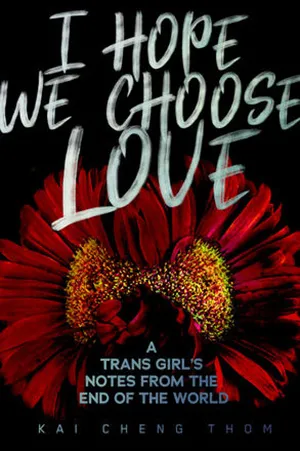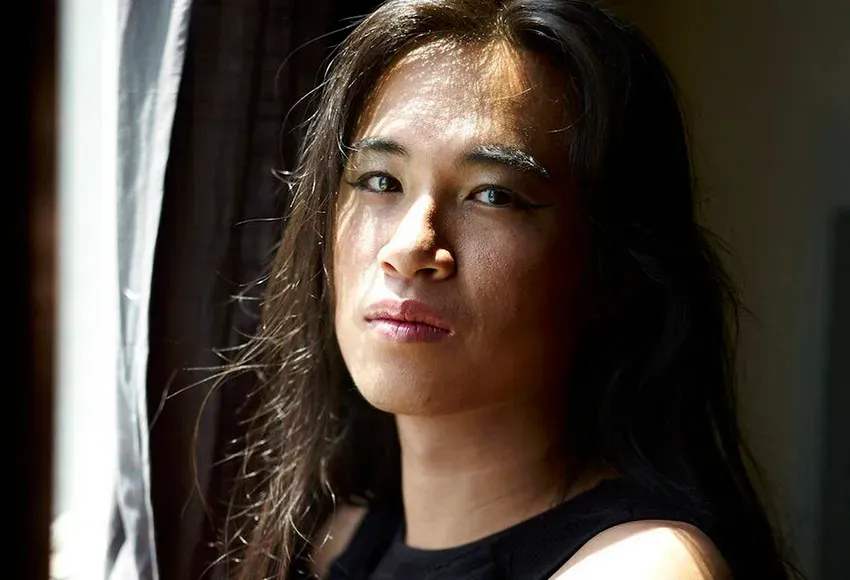As each day wears on, it can feel like we are living through the apocalypse. Climate change, anti-LGBTQ legislation, and constant new waves of COVID pound our community, draining what little radical hope we may have somehow held onto. With all this darkness, it can be hard to move forward.
Yet writer and activist Kai Cheng Thom has graced us with I Hope We Choose Love: A Trans Girl's Notes from the End of the World, a series of essays divided into three parts, reflecting on everything from Trans identity to the Queer community to the constant feeling of impending doom that seems to weigh heavy on us all.

The problem with SJWs
She begins her writing by calling out the problems of social justice culture. Thom reminds readers that her critiques of the movement are not on the same level as conservative and centrist thinkers (referring to the latter as "right-wingers without the backbone to call themselves that") and that there are several merits to social justice work.
The follies of the movement start with its emphasis on privilege. As Thom argues, "In the social justice movement, privilege is our original sin... shame and judgment are the twin flames of trauma, and we are trained to see ourselves and others through their eyes."
Akin to this thinking, she calls out social justice warriors who treat those with marginalized identities, such as BIPOC Trans women, as the saviors of the movement, expecting them to contribute to a cause simply because of their existence. "In the social justice movement, the price of a trans woman's presence is to play the part of a revolutionary figurehead, to raise her voice like a Valkyrie leading an army into battle, and to perform survivorhood in exchange for praise."
Diving deeper into her critiques of radical liberal communities, Thom also recognizes the unspoken toxicity of the Queer community. She explains that the problem is complex, because the community is made up of traumatized people longing for acceptance in this world. Because abusers in the community tend to come from a background of victimhood themselves, she notes it is easy for us to overlook their sins, which ultimately enables others to suffer from their abuses.
Queer enablers and the fight for mental health
Enabling, she argues, is the greatest flaw of the LGBTQ+ community. "We do it because this is how queer counterculture has trained us to love," she explains. "Because so many of our formative experiences of family, education, and health care have been authoritarian."
The Queer community enables abuse, self-harm, and toxic cycles because to limit individual freedom and expression is to succumb to the fascist behaviors of our previous abusers.
"We tell them that they know themselves best, and if self-harm is the only option that they see for survival, then they should go on doing it, no questions asked," Thom writes. She says enabling contributes to high LGBTQ+ suicide rates. "The urge to overvalidate comes from our fear of crossing boundaries, of replicating the traumas that abusive families and social oppression have enacted on our developing selves."
Thom continues her analysis of the relationship between overvalidation in the Queer community and mental health with the essay "Robin Williams, Mental Health, and the Stories We Tell about Suicide." This section dives into the taboo around suicide, and calls on readers to stop referring to mental illness as a "disease."
She posits that mental health is a community issue, not an individual one. Thom argues that when we reduce someone's suicide to a result of their "poor mental health," we refuse to acknowledge the roles we, as a society, have played in their death.
When we equate suicide to a disease, Thom says, "We are also saying that person did not die of abuse, of neglect, of isolation, of horrifying individual circumstances, of social oppression, of the fact that just living in this place and this time is very often an incredibly difficult thing."
She asks the reader, "How does immediately jumping into a medicalized dialogue around individual mental health allow us to avoid discussing the fact that we have created social environments that make us suicidal?"
She marries the topics of suicide and Queer overvalidation in order to dissect the incredibly high suicide rates of Trans girls in her essay "Stop Letting Trans Girls Kill Ourselves." In it, she once again brings forward the idea that sometimes loving and caring for someone means taking away their autonomy.
Contrary to many far-left arguments about individualistic freedom, Thom defends her stance. She argues that "the predominant (white, colonial) queer/trans narrative of 'proper' consent to being cared for goes something like this: Someone expresses that they are in pain, or you happen to see that they are. You offer them help. If they refuse, you back off, no questions asked. Any further attempt to help could be considered a violation."
Thom calls out this way of thinking, stating that as a community, we need to understand the nuances of violation and see that sometimes unwanted intervention is necessary. "This was not something I had been taught to believe in the queer community," she writes, "that love and care might mean following someone, even after they have rejected you."
She argues that Trans women die by suicide because of the conditions of the world they live in. Supporting Trans women, and respecting them and their decisions, does not mean allowing them to kill themselves. "There is a big fucking difference between not shaming or pathologizing a suicide and being complicit in it," she concludes.
A look at abuse in LGBTQ community
In part 2, Thom's critique of the LGBTQ+ community comes via the lens of the #MeToo movement. As she reflects on it, which kicked off in the fall of 2017, she calls out members of her Queer community, not for taking part in the abuse per se, but on the hypocrisy of calling out others when they enable similar behavior in their circles. In writing in this vein of "cancel culture," she says, "we make monsters from that which we fear to see in the mirror."
She describes intimate encounters with domestic violence and abuse within the LGBTQ+ community, even though many feign ignorance and assume that these are only patriarchal and heterosexual issues.
The complexity of domestic violence, according to Thom, is that those who suffer abuse are more likely to become perpetrators later on. Statistics already show that LGBTQ+ youth are at a higher risk of abuse from parents, classmates, and other members of heteronormative society. Because of this, they are likely to bring abuse into LGBTQ+ spaces and normalize it.
"In the world I had grown up in, love and rage were so closely linked as to be almost synonymous, and I know that I am not the only one," Thom writes. "Isn't that the message that parents give to queer children as they punish them?"
Thom's critiques, when read in the wrong tone, may sound conservative, but they come from a place of love. She calls out the community that she cherishes to make it better. Thom recognizes that the LGBTQ+ community has a complex relationship with abuse, as many are simultaneously victims and perpetrators.
Thom also brings readers back to the fundamental question she addressed in her chapters on suicide. "I wonder if there are other truths that we miss when we focus solely on understanding intimate violence as an individual choice made by a few monstrous people, rather than as part of a systemic problem in which we all play a part," she asks.
She raises questions that the blissfully ignorant refuse to address. Through her arguments, she fishes out the root of the problem: the Queer community is at a crossroads, and how we choose to move forward will determine how we address Thom's critiques.
Where are we going: neoliberalism or a radical future?
Thom blames neoliberalism for the crossroads the Queer community now faces. When the Queer liberation movement first began in the '60s and '70s, Thom explains, most LGBTQ+ people were after a radical change. They did not wish to assimilate into the heteronormative culture but rather dismantle it. Now, as affluent, white (mostly Gay and Lesbian) people become accepted and celebrated, the community's goals have shifted.
"In later decades... [the LGBTQ+ community] became increasingly focused on the narrower goals that primarily served the interests of white, middle-class, cisgender gays and lesbians: the rights to marry, adopt children, serve in the military, and work in prestige professions," Thom writes.
She uses celebrities like Caitlyn Jenner as an example of the ways members of the LGBTQ+ community have fallen into the neoliberal trap. "The myth of exceptionalism has always been a cornerstone of neoliberal philosophy – the idea that since a few people can 'make it' under capitalism, then everyone else can too," Thom explains.
This ideology is dangerous to the community, she warns. Neoliberalism places responsibility, guilt, and exceptionality all on the individual. The result is blaming the mentally ill for their conditions, seeing sexual assault as an individual flaw and not a reflection of the community, and expecting LGBTQ+ people to pick up the tools of heteronormativity to assimilate, giving up their former dreams of a radically new world.
The idea of assimilation as a necessity, while perhaps attainable for cis, white, middle-class Queers, is much harder for Trans people, like Thom. She explains that this way of thinking puts a higher burden on Trans people to "pass," and punishes those who, for financial or personal reasons, cannot.
"I don't want to live in a world where middle-class trans people can use public washrooms that match their gender identities, but homeless trans people are barred from public spaces," Thom says. "I don't want to live in a world where trans people are put in prisons that match their gender identity; I want to live in a world without prisons."
She uses her last few chapters to call out members of the LGBTQ+ community who celebrate small victories or assimilation and lose sight of the greater goal of reinvention.
A radical manifesto and love letter
I Hope We Choose Love is a radical Queer manifesto, a love letter to a community that the author is not afraid to critique. At times raw, triggering, and pointedly controversial, Thom's memoir is a work of art. She balances her prose with pages of thought-provoking poetry and uses both to draw in the reader. Thom reminds LGBTQ+ readers that, despite existing in a community that rejects binaries, we are sometimes unable to look at all the gray that exists in our own spaces.
Thom brings up difficult topics like suicide, mental health, and sexual assault, not to trigger readers but to examine how black-and-white thinking on punishment and guilt simplifies these problems. She doesn't hold back in her critiques of the community, and while she does praise the resiliency of the Queer community, she also notes that surviving shouldn't be a prerequisite to membership.
I Hope We Choose Love is thought-provoking. It is the kind of book you cannot read just once. It will call to you to reexamine all the stages of your Queer lifetime. Kai Cheng Thom is a revolutionary of Queer theory, and she calls on us to keep the torch lit.


